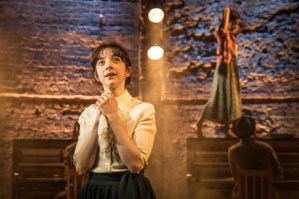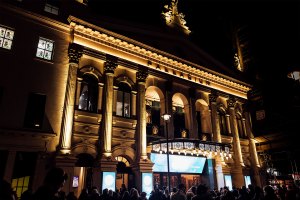Review: Fanny and Alexander (Old Vic)
Stephen Beresford adapts Ingmar Bergman’s cinematic masterpiece for the stage
The chill weather lent an atmospheric hand to the opening of the Old Vic’s staging of Ingmar Bergman’s 1982 epic Fanny and Alexander, freezing the audience into a suitable simulacrum of the Swedish winter in Uppsala where the story begins.
I took my seat in a cold grump yet was immediately entranced as young Alexander (Misha Handley on the night I saw it) appeared before the glowing red curtain and announced in confident tones: "You are about to watch the longest play in the history of the world!" Well, not quite, though at three and half hours this sprawling family saga, set in the first decade of the 20th century, is still a hefty investment of time. It’s shorter, however, than Bergman’s 188-minute cinematic version, which in turn was cut down from the 312-minute TV version which, when released as a film, really was one of the longest in history.
I am not absolutely sure I understand why writer Stephen Beresford wanted to adapt this rich film into a stage show, but he and director Max Webster have done so brilliantly. Although some scenes are played word for word from the original, they slightly alter the themes, speed up the action, and add some much-needed humour. The result is engrossing and rewarding.
Red curtains provide the key to designer Tom Pye’s vision of the dramatically-inclined Ekdahl family, who run and perform in a successful theatre. The heavy velvets swish and whirr around the stage, creating the rooms of the theatre and the comfortable family house where we first meet them, celebrating Christmas. Beresford has come up with a clever framing device for narrating the story; he also uses it to list, with mouth-watering effect, the elaborate food they are eating, as they mime its consumption.
As on screen, these early scenes are a joy. The key part of materfamilias Helena has been given a nicely ironic, long-suffering sense of humour. In the hands of Penelope Wilton she is both magisterial and warm, full of a realisation of time passing, and tenderness for her family, but sharply acerbic and commanding. The scene where she sits and reminisces with Michael Pennington‘s gently philosophical Isak Jacobi, remembering the day when her late husband discovered their affair – "He was holding a gun; I was holding his leg" – was my favourite of the entire evening, just two wonderful actors making transformative magic with the power of their imaginations.
This sense of transformation, of the life-giving, chaotic power of fantasy – which is part of the theme of the piece – grinds to a terrible halt when Fanny and Alexander’s father Oscar dies suddenly and their mother Emilie (a heart-rending Catherine Walker) comes under the spell of Kevin Doyle’s calvinist bishop Edvard, a man who puts heavy emphasis on the more ferocious aspects of the Christian religion. When she marries him, renouncing her former life in search of truth and reality, the play reflects that with a remarkable scene change, to a harsh white box. The menu, still recited, changes too: cabbage soup and black bread.
Mark Henderson’s wonderfully atmospheric lighting, sculpts the children’s suffering, the sudden loss, the encounter with cruelty as Alexander is beaten for telling stories about his hated step-father. "I am punishing you out of love," Doyle’s bishop explains, and he is a good enough actor to make you see the anguish of the man as well as his terrible anger. The effect of the staging, as the story unwinds through tragedy, familial love, and supernatural events, is to make us feel that change, to build it into the fabric of the evening.
It’s impressive stuff and it’s bolstered by exceptional performances both from Handley and Katie Simons (as Fanny) and from a supporting cast that includes Jonathan Slinger as the philandering but life-enhancing Gustav, whose humane faith in flawed humanity is set fiercely against the bishop’s unflinching belief in his rectitude.
I wondered about some of the adaptive choices: making Alexander haunted by death rather than by the ghost of his father seemed oddly reductive. But I did admire it enormously. In celebrating the power of stagecraft, Beresford and Webster have made a truly effective slice of theatre.
Fanny and Alexander runs at the Old Vic until 14 April.

















